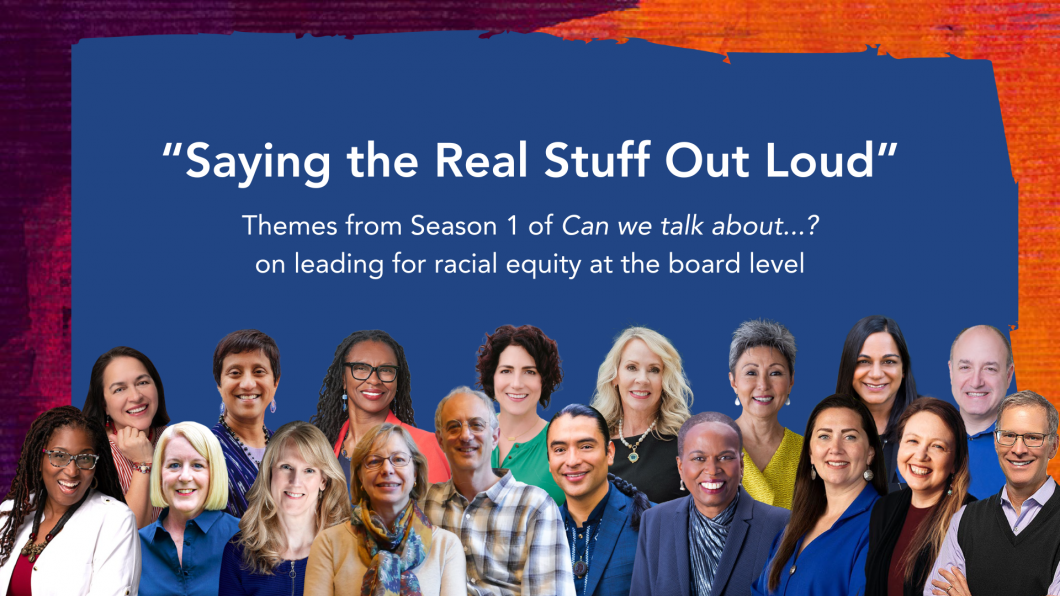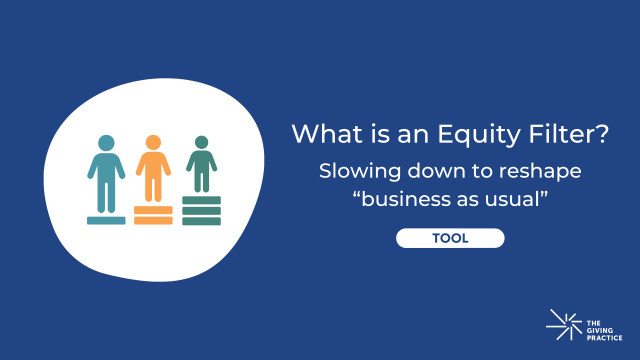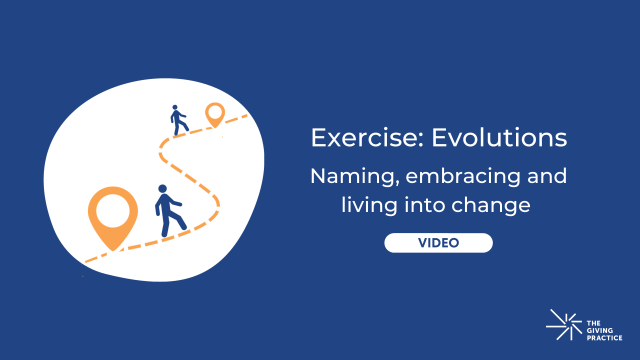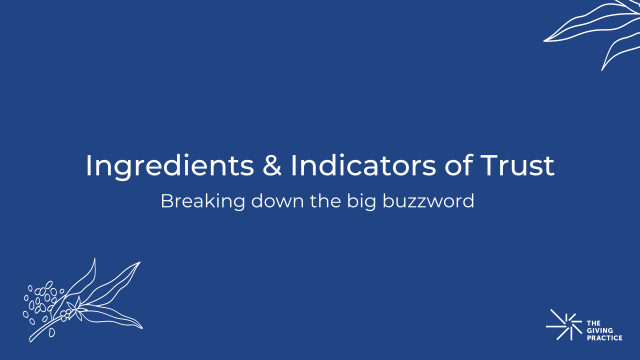
Can we talk about…? began as an experiment based on an observation: For the complex, messy work of advancing race equity, the most valuable tool often isn’t a tool at all. It’s peer support.
The podcast, from The Giving Practice at Philanthropy Northwest, builds on 10 years of facilitating executive cohorts on race, power and inclusion. In these confidential spaces where leaders could be open and vulnerable – where they could “say the real stuff out loud,” as podcast guest Monika Kalra Varma put it – they were able to surface common leadership challenges that were previously unnamed or even hidden. Together they normalized what it was like to lead for racial equity. And from there, they co-created new paths forward – new ways of working to make their equity commitments a reality, empowered by support from their peers.
The Power of Peer Support
When leaders have trusted spaces where they can be open and vulnerable, they’re able to normalize common, previously unnamed challenges, and finally, create new paths forward together.
We wondered, could we share this power of peer support with the broader philanthropic community? Would it be possible to lift the veil of confidentiality offered in these peer spaces and amplify these new paths forward towards equity and racial justice? And not to mention on one of philanthropy’s least talked about topics: our boards and governance structures?
Nine episodes later, we are heartened and inspired by the leaders who joined us in this experiment and said yes. Together, our 22 guests shared candid reflections and honest perspectives on the work of advancing racial equity at the governance level.
We are immensely grateful for their courage, vulnerability and willingness to learn in public. As we stitch together their wisdom, we’re eager to share a set of mindsets and practices to advance equity-centered governance as surfaced – and normalized! – by our Season 1 guests.
Mindsets to Advance Equity-Centered Governance
1. Discomfort as a Duty
In all nine episodes, guests highlight difficult, uncomfortable conversations as critical to their board’s equity journeys. They invite us to not only expect discomfort as part of the work, but also embrace it as a duty.
A few of our guests reminded us of the power of defining shared agreements or norms with your board to support hard conversations:
2. Diverse boards as a necessity
Despite stated commitments to equity, foundation boards are still “woefully undiverse” to this day as Kevin Walker puts it. In nearly every episode, guests underscore how essential diverse perspectives and appropriate representation are to advancing equity, calling philanthropy in to take action on this continuous gap at the leadership level.
How might boards increase representation and diversity? It begins with intentionality and continues with perseverance and a steadfast commitment:
“Really, the trail begins in the nominating and Governance Committee, and the question is, is diversity in every candidate pool of new board members going to be a priority? Because if you want to drive change, the answer to that has to be yes. If it's tacked on as an afterthought – that we need a more diverse board – you're never going to drive change at scale. If it's a thing that is always in the mix, and given a high level of importance, every darn cycle, that I think is when an organization can begin to change itself.” Kevin shares.
3. Making mistakes as part of the process
Across our season, guests remind us that when there is no roadmap or checklist to follow – when we’re working to co-create and practice new ways of working – we will make mistakes and missteps. As we make mistakes our growth lies in what we learn from them, how we repair harm and how we apply lessons learned moving forward.
Guests admittedly share that they themselves or their boards have even repeated the same mistakes before ultimately getting on the right track:
Practices to Advance Equity-Centered Governance
1. Incorporating practices that deepen relationships and build trust across your board
Nurturing a board that embraces difficult conversations, diverse perspectives, and making mistakes requires building trusted, human-to-human relationships that defy the transactional nature of most workplace cultures.
- “...one thing I've learned from this whole process is how important the relationships are... Philanthropy, before this, for me, and just when I look around, is so transactional. It's almost like a business. And when you bring in community and relationships, it's different.” - Bill Marklyn
- “Can we really focus on working to see the humanity in everybody? I think if we did that –whether it's at our work, in our foundations, in the community, across the nation – I think we might be having a different kind of conversation. And we might begin to bend the arc of injustice that has been at the core of so much of hurting among communities that have been disadvantaged in the power table.” - Brenda Solorzano
Guests mention informal, out-of-boardroom relationship-building opportunities, increased communication, and formal activities like storytelling and self-reflection as common board practices that they’ve adopted.
- “During my tenure, we really started to include self-reflection as part of our practice so that we could see who we were as people coming into our boardroom – our lives, our families, our struggles, our work – and all the gifts that we bring into the boardroom.” - Debra Nakatomi
- “I believe in informality across the board. I think it makes for better governance." - Larry Kramer
- “We invested time and energy in those kinds of relationships inside and outside of the boardroom. Getting to know each other as human beings, not just as board members. And so when things were really messy, I think that piece was foundational.” - Julia Wilson
2. Talking about power
Throughout the season, we heard that there is a need for boards to get comfortable talking about power – where it sits and why, and how power dynamics affect decisions at the organizational, team and interpersonal levels When boards can recognize and name how power moves within their organizations, they can then work to ensure it ultimately moves towards the communities they are serving.
3. Shifting outdated board by-laws and policies
How do you sustain and institutionalize shifts in equity-centered board practices? Guests mentioned turning to their bylaws and board manuals, identifying those that were outdated or rooted in white-dominant culture, and updating them to codify new practices that foster inclusive, equitable board cultures. One of the most mentioned practices that boards had interrogated was Robert’s Rules of Orders.
As we wrap up season 1, we want to thank not only our guests but also our listeners. We hope you’ve found inspiration and empowerment in your peers’ stories, and we look forward to working alongside you as we continue our collective journey of sector-wide transformation towards equity and racial justice.
You can find all episodes with accompanying episode guides (including references, resources, reflection questions and exercises) here. For a compilation of resources and reflection questions, you can view our Season 1 companion guide here.
If you are looking for support in leadership and governance, please reach out to us at hello@thegivingpractice.org.
Aya Tsuruta is the Associate Director of Marketing and Communications at Philanthropy Northwest and The Giving Practice and Executive Producer of Can we talk about...? Thank you to TGP Senior Analyst and Can we talk about...? Producer Emily Daman and Senior Advisor Mark Sedway for their editorial support on this post. You can learn more about our team here.
Join our mailing list to stay up to date on our latest reflections, insights, interviews and more.




